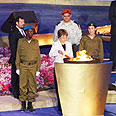
State of Israel turns 59
Monday night torch-lighting ceremony marks end of Memorial Day, ushers in Independence Day celebrations
Israel's leaders on Monday evening participated in a torch-lighting ceremony at Mount Herzl, marking the end of Memorial Day and the beginning of Israel's 59th Independence Day. At 8 pm, guests of honor lit 12 torches, with the lighting of the final torch serving as the official kick of for Independence Day celebrations.
Acting President Dalia Itzik, whose speech opened the ceremony, referenced the connection between Independence Day and Memorial Day, saying "our grief encompasses our joy.
"Dear citizens, we live in a long war whose end we cannot see. Alongside our peace treaties with Jordan and Egypt, we hear from near and far, constant sounds of war." Addressing the source of such incitement, she asked Iran and Syria to "leave off your wickedness, for Israel lives and lets live."
"Residents of Iran, Syria and the Palestinian Authority, has there not been enough blood spilled, yours and ours? Replace your Katyushas and Qassams with computers and education, and finally, be rewarded with peace and quiet," she said.
Torch-bearers at this year's ceremony were:
- Yitzhak Navon: A former Israeli president, in office from 1978-1983.
- Eliyahu Sakharov: The aide to the Hagannah chief in the 30s.
- Shulamit Cohen-Kishik: A Mossad agent from the late 40s, who helped bring persecuted Jews from Arab nations to Israel and escaped a death sentence in Beirut.
- Professor Joseph Shenkar: A world renowned obstetrician/gynecologist, director of the OBGYN wing of Hadassah hospital and professor at Hebrew University.
- Avinoam Mor-Haim: An actor, and father of Dvir, who was killed in Lebanon.
- Rachel Saad-Nakar: A former fighter in the Lehi pre-state resistance movement and sister of Meir Nakar - one of the last Jewish fighters to be executed by the British in 1947.
- Mordechai Eliav: The founder and director of the 'First Jerusalem' midrasha, the 'To Jerusalem' education center and the Western Wall Heritage Foundation. He is a Holocaust survivor.
- Uri Amadi: Founded a work program in Jerusalem, promoting education of youths from East Jerusalem who work in the market.
- Professor Nava Ben-Zvi: A leading figure for the advancement of higher education in the sciences in Israel, she was a founder of the Open University in 1975 and is now president of Hadassah College, in Jerusalem.
- Ruth Heshin: President of the Jerusalem Foundation, which aims to improve the wellbeing of city residents.
- Senior Staff Sergeant Major Avraham Yehuda Shriki: A senior sapper in the Jerusalem district police force, he received numerous citations for his treatment of carbombs in Jerusalem, the removal of a missile from the body of a wounded soldier, and the neutralization of a suicide bomb on a captured terrorist.
- Police chief superintendent Faras Faraj: He served during the Second Lebanon War as the commander of the police station in Kiryat Shmona, a town that was hit by over a thousand rockets at that time.
- Staff Sergeant (res) Yosef Lieberman: The son of Holocaust survivors, he served in each of Israel's wars since the War of Attrition and received a citation for service from the Chief of IDF Central Command
- Major (res) Dr. Dor Yehuda: An expert in orthopedic surgery, who volunteered to serve in Lebanon during last summer's war.
In addition to the torch lighting, the ceremony was also comprised of musical performances and speeches by important public figures.
Defense Minister Amir Peretz invited families of kidnapped Israeli soldiers to the ceremony at Mount Herzl.
Among those who attended were the families of the three soldiers kidnapped by Hizbullah in 2000, the families of Ehud Goldwasser and Eldad Regev kidnapped by Hizbullah in 2006, and the family of Zachary Baumel, captured in battle in 1982.
Israel of 2007 is a very different country from Israel in 1948. The population has grown almost by almost nine times and stands at almost seven million people. Israel now has five cities with over 200,000 residents each, a far cry from 1948, when Tel Aviv was the only city with over 100,000 residents.
Hanan Greenberg and Avi Cohen contributed to this report










